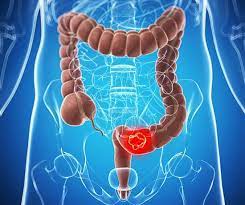It’s the fourth most common cancer in men and women combined, but it’s still relatively rare. Rectal cancer is a malignant growth, which can affect the rectum. The large intestine, commonly called the colon, is part of your digestive system. It is responsible for absorbing water from digested food and passing it on as waste to the rectum. Rectal cancer occurs when some cells start dividing uncontrollably and form a tumor inside the wall of the rectum, which may spread to other parts of the body through lymphatic flow or the bloodstream. Rectal cancer is a serious and sometimes fatal cancer that was once thought of as a disease of old age. However, within the last 50 years, it has become a young person’s disease. Rectal cancer is a cancer of cells in the rectum, the final resting place of feces. The rectum is the last section of the large intestine and transmits waste material to the anus.
What are the causes of rectal cancer?
The risk factors for this disease include heredity, being overweight or obese, eating a poor diet high in red meat and processed meats, being exposed to asbestos, working with certain chemicals or pesticides, smoking cigarettes, or drinking excessive amounts of alcohol. The most common risks include family history, poor diet, lack of exercise, and smoking. However, not everyone who has these factors develops the disease. Other risk factors include heredity, immune system-related conditions, and infections with certain viruses. Rectal cancer is an aggressive form of malignant cancer that develops in the rectum and colon. There are several risk factors for developing rectal cancer, including age, gender, diet habits, genetics, and family history. Research has shown that the most common cause of this type of tumor is chronic inflammation as a result of infection by the Human Papilloma Virus (HPV). This virus can be transmitted through sexual contact or anal intercourse with an infected partner.
What Are the Symptoms of Rectal Cancer?
While many women in their 30s and 40s experience benign conditions, some may have cancer. Rectal cancer is a form of colorectal cancer that develops from the cells lining the rectum. In the United States, about 10% of all cancers diagnosed in men and 3% of those diagnosed in women are rectal cancers. If you have been experiencing rectal bleeding, fatigue, weight loss or pain, abdominal discomfort, and dizziness for a long time, there is no need to worry. It may be the symptom of rectal cancer. But, rectal cancer symptoms are the same as symptoms of bleeding in the stool. Bleeding can happen due to cancer or due to another condition. For rectal cancer symptoms, bleeding in the stool is the most common symptom. Anal bleeding is a common symptom of rectal cancer. Bleeding from the anus can be caused by many different conditions. Rectal bleeding, or proctalgia fugax, is defined as painless rectal bleeding lasting for less than 24 hours. The term is often used interchangeably with hematochezia, which means bright red blood per rectum. It occurs in 1% to 1% of the population, and it becomes more common with increasing age.
What are the types of rectal cancer?
There are four main types of rectal cancer: carcinoid, adenocarcinoma, lymphoma, and sarcoma. The different types grow and spread at different speeds and respond differently to a treatment.
Carcinoid Rectal Cancer
Carcinoid tumors are neuroendocrine tumors that occur in the GI tract, pancreas, bronchus, lungs, and other organs. The majority of carcinoids originate from the small intestines or appendix. Carcinoid tumors can be either non-functional or function as an endocrine organ. Carcinoid tumors are slow-growing and can be difficult to diagnose because they do not cause a significant mass in the body. The tumor results from cancer cells that have been released from another cancer, known as an “epithelial carcinoma”. Carcinoids are usually present for a long time before being detected, so early detection is important to maximize treatment options. Analgesics may help relieve the pain of anal bleeding.
Adenocarcinoma Rectal Cancer
Adenocarcinoma is a type of cancer that begins in glandular tissues. This form of cancer is usually found in the colon or rectum, but it can spread to other organs. Adenocarcinomas can also be found in the lungs, stomach, pancreas, and esophagus. It’s most common for adenocarcinomas to develop from pre-cancerous polyps or benign tumors. Adenocarcinomas account for about 50% of all gastrointestinal cancers and 90% of these tumors develop from the epithelial cells lining the colon or rectum.
Lymphoma Rectal Cancer
Lymphoma is a type of cancer that begins in the lymphocytes, which are an important part of your immune system. Lymphomas develop when cells in the lymphatic system grow abnormally and multiply in an uncontrolled way. This can lead to either Hodgkin or non-Hodgkin lymphoma, depending on the specific type of cell involved. The lymphatic system helps filter out bacteria in your body. Lymphoma is not contagious like some cancers. Most often, it begins in the cells of your immune system that grow abnormally and form malignant tumors outside or inside parts of your body such as your intestines, liver, or bone marrow.
Sarcoma, Rectal Cancer
Sarcoma is a rare type of cancer that affects connective tissues in the body. Sarcomas can affect any part of the body, but they most often occur in the bones or in soft tissue, such as muscles and fat. Sarcomas can be either benign or malignant. The survival rate for this type of cancer depends on whether it has spread from its original site to other parts of the body (metastasized). They grow slowly and usually stay in one place. The most common types of sarcomas begin in muscle, bone, or cartilage.
What are the stages of rectal cancer
Rectal cancer in stage 0
A diagnosis of stage 0 rectal cancer means the tumor is still confined to the lining of the anus or rectum. The patient may have no symptoms or just mild symptoms, such as irregular bleeding from the anus, a feeling that there is stool stuck in the rectum, constipation, gas pains, changes in bowel movements, and/or alternating diarrhea and constipation. Stage 0 rectal cancer is a very low-risk form of the disease. It’s not uncommon for people to have it and never know, since there are no symptoms in this stage. Stage 0 rectal cancer can be cured by surgical excision if detected early enough. However, at later stages of rectal cancer, surgery becomes impossible due to the involvement of nearby organs or structures within the pelvis.
Rectal Cancer in Stage 1
Stage 1 rectal cancer is typically treated with surgery to remove the tumor and a section of healthy tissue around it. Surgery for rectal cancer may require removing part or all of the large intestine (colon) and/or nearby lymph nodes. It has not spread to lymph nodes or other organs, but it may have spread through the wall of the rectum to other tissues in the pelvis or abdomen. At stage I, you can expect an overall survival rate of around 90%. However, 5-year survival rates for people with stage I rectal cancer range from 60%–75%, depending on your age and whether you are male or female.
Rectal cancer in stage 2
Stage 2 rectal cancers are still localized, so they can be surgically removed. Patients who have undergone surgery for stage 2 rectal cancer have a higher likelihood of cure than patients with non-resectable tumors. Once the tumor has grown to a size of 1 cm, it is classified as stage II rectal cancer. A doctor will use an endoscope to see cancer’s extent. This may be done by passing a flexible tube with a small camera on the end through the anus into the rectum or by removing part of the wall of your lower colon and rectum during surgery.
Rectal cancer in its third stage
Stage 3 rectal cancer is the stage at which cancer has spread to more distant parts of the body. Cancer may have spread to the lymph nodes in the pelvis, or it may have spread outside of the pelvis. Stage III rectal cancer is defined as being metastatic to the liver, lymph nodes, or lungs. In at least 50 percent of patients with stage III rectal cancer, lung metastases are present in at least 50 percent of patients with cancer. Cancer that spreads to the liver is called hepatic metastasis. It may be that the tumor spreads through the bloodstream or by direct extension into nearby blood vessels.
Rectal cancer in its fourth stage
Rectal cancer at stage 4 is the most advanced stage of the disease. When cancer spreads to other regions of the body, such as the liver or lungs, this stage develops. At this point, the tumor could have migrated to adjacent lymph nodes. Rectal cancer in stage 4 is more advanced than stage 3 and is more difficult to treat. Cancer has spread to neighboring lymph nodes or other sections of the body at this stage, and it has impacted the rectum. The sort of treatment you receive will be determined by your age, general health, the stage of the disease, and any limiting factors, such as poor heart or kidney function.
Rectal Cancer Treatment
Rectal cancer in humans is one of the rarest types of cancer, but it can be treated with surgery, chemotherapy, radiotherapy, and targeted therapies. It is estimated that there are around 6,000 new cases of rectal cancer diagnosed in the U.S. per year, according to the American Cancer Society. The treatment of rectal cancer is dependent upon various factors which include the following: The stage of cancer. The size and location of the tumor. The patient’s general health. The doctor’s preference. The staging system for rectal cancers is similar to that used in colon cancers (see Colon Cancer Staging). To stage rectal cancer, doctors examine the tumor with a combination of an endoscope (a narrow tube with a light and camera at the end) and x-rays.
The rectal cancer survival rate
Rectal cancer survival rates vary depending on several factors, including the stage of the disease and the type of treatment used. Early detection and treatment improve a person’s outlook. Rectal cancer can be cured with the correct treatment and early detection. The first step toward healing for patients who have been diagnosed with rectal cancer is surgery. For stage I and II rectal malignancies, surgery is frequently the only therapeutic option.
Prevention of Rectal Cancer
There have been many studies that have proved that the consumption of red meat can cause rectal cancer. This is a very serious disease and a lot of people die every year because of it. The incidence of colorectal cancer (CRC) is high in our society due to the widespread adoption of a westernized lifestyle. The incidence rate for rectal cancer in Korea has increased from 1.2 per 100,000 in 1999 to 2.2 per 100,000 in 2006. CRC can be prevented by modifying lifestyle and eating habits such as consumption of fruits and vegetables and avoidance of obesity, alcohol consumption, smoking, and physical activity.
Prognosis of Rectal Cancer
The prognosis of rectal cancer is dependent on several factors. These include the size of the tumor, how advanced it is, if there are any metastases, whether or not the tumor can be surgically removed, and if so, what kind of surgery was performed. If a patient has undergone chemotherapy and/or radiation therapy before surgery—to shrink the tumor—the outcome may be better. The prognosis for rectal cancer is related to the stage and cell type of the disease at diagnosis. The stage describes how far cancer has spread from its original location, while the cell type indicates whether it is anal canal adenocarcinoma or rectosigmoid adenocarcinoma.
In conclusion
In this article, we’ve covered all the basics of rectal cancer so that you can be better informed about what it is and how to deal with it. Rectal cancer treatment can vary depending on several factors, but in general, most patients will receive surgery to remove the tumor and some portion of the colon. Having a healthy lifestyle, especially a proper diet and exercise, can provide you with a lot of benefits. This is also true regarding rectal cancer. Your family history also matters. If you have been diagnosed with this kind of cancer, ask your doctor about the best ways to reduce its occurrence or progression. In some cases, treatment might be necessary as well as part of your overall care plan.








